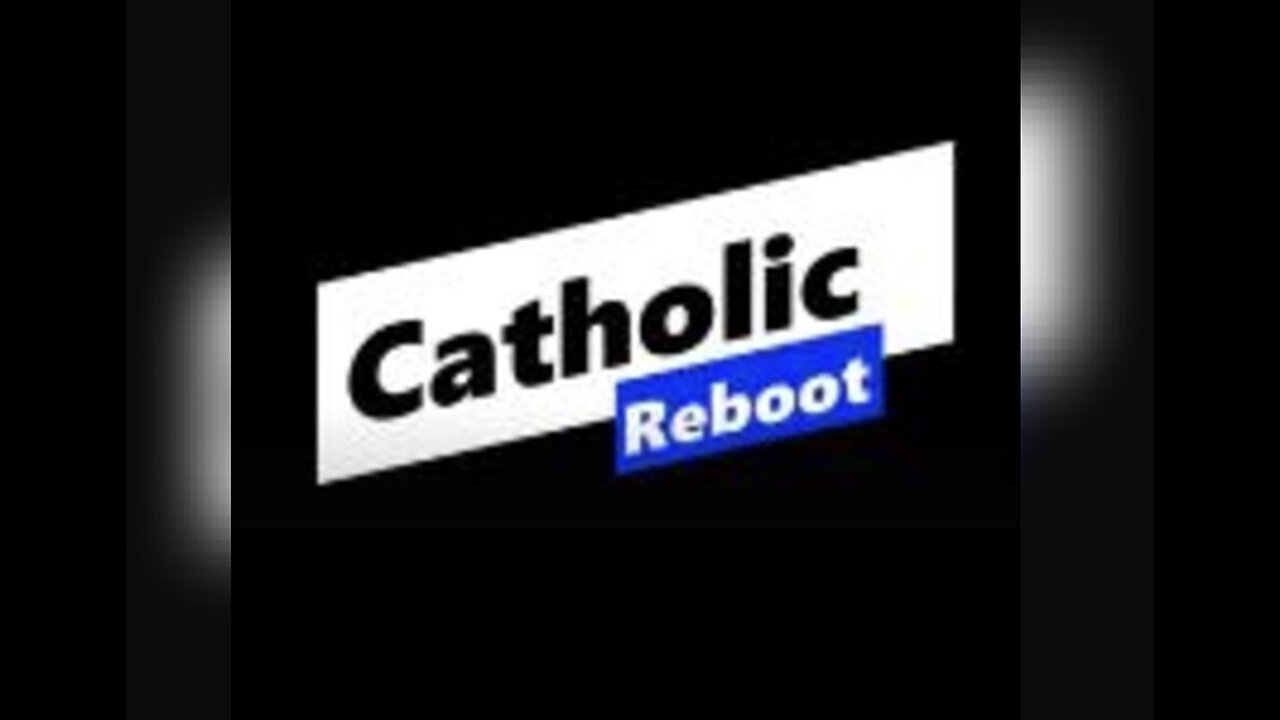Premium Only Content

Episode 2682: What are the 4 No's - Part 2 of 2
Section 3: The Third “No”-“No Family”
Communism sought to dismantle the traditional family, viewing it as a structure that perpetuated individual loyalties, religious values, and social stability that could potentially challenge the state's authority. Communist ideology promoted a reimagined family structure, encouraging communal childcare, diminishing parental authority, and normalizing ideologies that weakened the sanctity of marriage and family.
From a traditional Catholic perspective, recent shifts in Church teachings and attitudes toward family life sometimes seem to echo these principles, inadvertently undermining the traditional family structure and leaving the faithful vulnerable to secular influences.
1. Attack on Traditional Family Values
For traditional Catholics, one of the most concerning aspects of modern Church teaching is what they perceive as a growing acceptance of ideologies that undermine traditional family values. While the Church has always taught that the family is the “domestic church” and that parents have a solemn duty to raise their children in the faith, certain trends today seem to diminish these roles, aligning with secular values that threaten the stability of family life.
Acceptance of Alternative Family Structures: In recent years, the Church has at times seemed to adopt a more tolerant stance toward alternative family structures and lifestyles that depart from traditional marriage between one man and one woman. While the intent may be to show compassion, traditional Catholics fear that by not clearly upholding Catholic teaching on family, the Church risks encouraging lifestyles that diverge from God’s design for marriage and family.
Example: Church statements that focus on the “positive aspects” of diverse family structures can leave the impression that traditional marriage and family life are optional ideals rather than God’s intention for human flourishing. Traditionalists worry that by embracing these new interpretations, the Church dilutes its own teaching on the sanctity of marriage.
Diminished Authority of Parents: Traditional Catholics have also observed a trend in which the Church’s emphasis on the role of parents in faith formation has weakened. Parental authority and the responsibility to pass on the faith have historically been central to Catholic teaching, yet today some believe that Church institutions sometimes fail to support parents in this essential role.
Example: In Catholic schools, parishes, and some diocesan programs, parents have expressed concerns that their role as the primary educators of their children is being overlooked. Programs that promote “inclusive” curricula, for instance, can sometimes contradict parents’ efforts to raise their children in alignment with Catholic values.
2. Influence of Modern Culture on Family Teaching
Many traditional Catholics feel that the Church’s approach to family issues has, at times, reflected the relativistic values of secular culture more than the firm teaching of Catholic tradition. In an effort to adapt to the modern world, the Church may unintentionally absorb cultural values that undermine the sacred understanding of marriage, sexuality, and family life.
Relativistic Approach to Marriage and Sexuality: Some Church leaders and institutions seem increasingly influenced by modern views on sexuality, marriage, and gender roles, emphasizing “pastoral care” over doctrinal clarity. This shift has led to confusion among Catholics regarding issues like marriage permanence, contraception, and same-sex unions. For traditional Catholics, this ambiguity represents a departure from the firm stance that marriage and family are sacred, instituted by God as the foundation of society.
Example: In various Church documents and pastoral letters, the emphasis on accompaniment and “meeting people where they are” has sometimes overshadowed clear teaching on chastity, fidelity, and the lifelong nature of marriage. This reflects a tendency to embrace cultural relativism, which can erode the Church’s credibility on moral issues.
Shift Toward Secular Definitions of the Family: The Church’s emphasis on social justice, while valuable, can sometimes overshadow its commitment to defining family as the sacred union of husband, wife, and children. In promoting messages that prioritize economic security, gender equality, and societal integration, the Church risks downplaying its teachings on the importance of marriage as a sacrament and the family as the “domestic church.”
Example: In recent synods and Church statements, discussions around gender roles and family dynamics can appear influenced by secular notions of individual freedom and self-fulfillment, which challenge the traditional Catholic teaching that family life is a vocation of sacrificial love and mutual support.
3. The Traditional Catholic View
The traditional Catholic view of the family is deeply rooted in Church teaching and affirmed by popes, saints, and councils. Catholic doctrine emphasizes that the family is the “domestic church,” an essential community where children are formed in faith, virtue, and love. The Church has always celebrated the sanctity of marriage, upholding it as a divine institution meant to foster both the spiritual and physical well-being of its members.
Family as the Foundation of Society: Past Church documents, from encyclicals to councils, affirm that the family is the primary and essential unit of society. Pope Pius XI’s encyclical Casti Connubii states that marriage is a sacred institution designed by God for the procreation and education of children, and that it serves as a safeguard against societal decay. The family, in this traditional view, is a sanctuary where faith is nurtured and handed down from one generation to the next.
Example: In Casti Connubii, Pius XI writes, “Marriage is the first and most important cell of society, and the first place where children learn love and virtue.” This stands in contrast to any secular view that might downplay marriage’s role or redefine it according to modern ideologies.
The Role of Parents in Faith Formation: The Church has traditionally upheld that parents are the primary educators of their children, a role that cannot be replaced by schools or other institutions. The Catechism of the Catholic Church asserts, “The role of parents in education is of such importance that it is almost impossible to provide an adequate substitute” (CCC 2221). Parents are entrusted with the duty to guide their children in faith and morals, and this teaching remains central to the Church’s understanding of family life.
Example: Pope John Paul II, in his Letter to Families, emphasized the unique responsibility of parents to “form their children in love, morality, and faith.” This view reinforces the family as the fundamental structure through which children encounter Christ, making it distinct from any secular ideology that would view the family as optional or adaptable to personal preferences.
Protecting Children from Ideologies: Traditional Catholic teaching calls for the protection of children from ideologies that undermine the family’s moral foundation. The Church has warned of ideologies, particularly those that promote relativistic and secular views on sexuality and marriage, as threats to children’s spiritual welfare. This warning stands as a reminder to uphold Catholic values against external pressures that seek to redefine or diminish the role of the family.
Example: Pope Pius XII warned of secular influences that undermine the family, asserting that “nothing is more harmful than the loss of family life.” His words serve as a reminder of the importance of safeguarding the family as the bedrock of a Christian society.
Conclusion: The Importance of Upholding the Traditional Family
In contrast to the secular push toward “No Family,” traditional Catholic teaching asserts that the family is sacred, divinely instituted, and vital for the stability of society. By upholding traditional marriage, promoting parental authority, and protecting children from harmful ideologies, the Church fulfills its role as the guardian of the domestic church. Traditional Catholics believe that the Church must continue to champion the family as an institution set apart from secular society, essential for the faith and moral formation of future generations.
In summary, from a traditional Catholic perspective, the “No Family” ideology echoes in some modern teachings and practices within the Church, which may, inadvertently or otherwise, weaken the sanctity and unity of the family. By returning to her roots and emphasizing the importance of traditional family values, the Church can resist secular influences and reaffirm her commitment to the domestic church as the foundation of faith and society.
Section 4: The Fourth “No”- “No Private Property”
In communist ideology, private property is viewed as a barrier to equality and social harmony. The abolition of private ownership, replaced by state or communal ownership, was central to the communist goal of establishing a classless society. From a traditional Catholic standpoint, recent trends in the Church may appear to echo a similar stance, emphasizing themes of wealth redistribution, environmental stewardship, and social justice without the longstanding Catholic teaching on the moral and practical necessity of private property.
1. Shift Towards a Communal Worldview
In recent years, certain Church teachings and statements from Church leaders have placed a significant emphasis on economic redistribution, environmental activism, and a communal approach to resources. While these teachings are often framed as a response to the challenges of poverty and environmental degradation, traditional Catholics express concern that these discussions lack the traditional emphasis on the right to private property, which Catholic doctrine has long held as essential for human dignity and freedom.
Diminished Emphasis on Private Property: In numerous documents and statements, the Church has spoken on the importance of sharing resources and aiding the poor, yet traditionalists feel that an overemphasis on redistribution risks overshadowing the Church’s teaching on the importance of private ownership. The right to own property has traditionally been upheld as part of human dignity and the ability to provide for one’s family. For many traditional Catholics, this shift suggests a potential move towards collectivist principles that undermine individual responsibility and the fruits of one’s labor.
Environmental Focus: In various Church teachings, there is a growing emphasis on environmental issues, including a call for global policies that promote resource sharing and a more sustainable lifestyle. While these initiatives are vital for stewardship, traditional Catholics worry that these ideas, if not balanced, might resemble the socialist notion of communal ownership over resources rather than emphasizing responsible individual ownership.
Example: Statements on environmental issues, for instance, might call for radical policy changes, like mandatory resource sharing or redistribution of wealth on a global scale, which can inadvertently promote a collectivist approach rather than addressing the individual’s right to own property responsibly.
2. Examples of the Modern Church’s Economic Focus
There has been a notable shift in some Church leaders’ language around wealth distribution, social equality, and environmental initiatives, leading many to see parallels with the collectivist ideas proposed by secular political movements.
Calls for Wealth Redistribution: Recent statements by some Church leaders have included calls for large-scale economic redistribution as a means to achieve social justice. While the Catholic Church has always advocated for care for the poor, these new approaches may lack the traditional emphasis on voluntary charity and individual responsibility, focusing instead on political solutions for economic inequality.
Example: Statements urging “systemic change” to address inequality can appear to endorse wealth redistribution as a solution, where property and wealth are viewed collectively rather than as the rightful fruits of individual work and responsibility. This can blur the line between legitimate charity and forced redistribution.
Environmental and Social Initiatives: The Church has increasingly promoted social and environmental initiatives with globalist undertones, which can include calls for shared resources, international regulatory standards, and environmental goals that seem to prioritize collective ownership over individual rights. This stance can be seen in recent Church endorsements of environmental treaties and social policies that emphasize global cooperation and shared responsibility, often at the expense of personal autonomy.
Example: In calls for a “common home” and shared responsibility for the environment, some traditional Catholics feel that the Church may unintentionally promote a vision of communal ownership that could infringe on the personal right to private property, a departure from the more balanced perspective found in traditional Catholic social teaching.
3. Catholic Social Teaching: The Principle of Private Property
While the Church has always called for social justice, charity, and care for the poor, Catholic social teaching also upholds the principle of private property as a natural and fundamental right. This balance allows for both personal responsibility and societal care, ensuring that wealth and property are used wisely but remain in the control of individuals and families.
Private Property as a Natural Right: The Catholic Church has long defended private property as a right rooted in human nature. According to the principle of subsidiarity, people have the right and duty to manage their own resources, families, and businesses, while larger governing bodies should only intervene to support, not replace, personal and family autonomy. Documents such as Pope Leo XIII’s encyclical Rerum Novarum and Pope Pius XI’s Quadragesimo Anno emphasize that private ownership of property is essential for human dignity, personal freedom, and social stability.
Example: In Rerum Novarum, Pope Leo XIII writes, “The right of private property must be regarded as inviolable; it is a most sacred right.” This teaching is in stark contrast to any ideology that seeks to eliminate private ownership in favor of collectivist control.
Private Property and Charity: Traditional Catholic teaching asserts that private property is compatible with the call to charity. By promoting a personal and voluntary approach to helping the poor, Catholic teaching safeguards against the potential for forced redistribution, encouraging instead that individuals freely use their wealth to aid those in need.
Example: St. Thomas Aquinas upheld that the goods we possess are intended for use in service to others, yet he also emphasized that it is a moral obligation rather than a political one, underscoring the role of personal choice in practicing charity.
Subsidiarity and Social Responsibility: The Church teaches the principle of subsidiarity, which emphasizes that matters should be handled by the smallest, most local competent authority rather than by overarching systems. This ensures that personal responsibility and family autonomy are maintained without unnecessary interference. While social programs are essential, they must support individuals in using their resources responsibly rather than replacing individual ownership with collective control.
Example: In Quadragesimo Anno, Pius XI affirms the need for a just society, balancing the collective good with personal freedom and responsibility. This principle stands in contrast to any collectivist approach, reminding Catholics that while charity and social justice are essential, they must respect personal rights and the structure of the family.
Conclusion: Upholding the Balance of Charity and Private Property
In sum, while the Church’s call to charity and justice remains a vital part of Catholic teaching, the right to private property is also essential. Traditional Catholic doctrine upholds private property not merely as an economic principle but as a foundation of human dignity and freedom. True charity stems from individuals and families who, through their own means, offer support to those in need. By encouraging personal responsibility and respecting individual rights, the Church can better fulfill her mission to care for the poor while safeguarding against ideologies that prioritize collectivism over personal dignity.
For traditional Catholics, preserving this balance between charity and private ownership allows the Church to avoid unintended alignments with ideologies that promote collective ownership at the expense of individual autonomy. A return to the traditional teaching on private property and subsidiarity reaffirms the dignity of each person, the sacredness of the family, and the responsibility each individual has toward both their community and the Church.
Why This is Concerning
Traditional Catholics worry that this approach not only dilutes Catholic identity but also risks compromising eternal truths for the sake of temporary ideals. By adopting elements that align with the “four no’s” of communism, the Church may inadvertently promote a worldview that conflicts with her fundamental teachings. The danger, as they see it, is that instead of transforming the world through Christ, the Church risks being transformed by the world, losing her spiritual authority in the process.
A Call to Action: Defending the Church and the Faithful from the Threat of the Four Communistic "No’s"
In light of the dangers posed by the creeping influence of these "Four No’s" within the modern Catholic Church, every faithful Catholic is called to stand resolutely in defense of the true teachings of Christ and the traditions that have sustained the Church through centuries of trials. This call to action is comprehensive, urging clergy, laity, families, and Catholic communities to fight back against the ideologies that threaten to undermine our faith, our values, and our Church’s sacred identity.
1. Reaffirm and Defend the First Principle: “Yes” to God’s Sovereignty
Deepen Your Faith and Knowledge: Equip yourself with a firm understanding of Catholic doctrine and the scriptural foundations of God’s sovereignty. Attend classes, read papal encyclicals (especially pre-Vatican II teachings like Quas Primas by Pius XI on Christ’s kingship), and commit to daily prayer and study of the Bible.
Speak Boldly about God’s Kingship: The Church has always taught that God reigns over all aspects of life, not just in church or personal devotions. Make it known in your conversations, social circles, and parish life that our loyalty to God must come first, transcending any secular agendas.
Restore Reverence in Worship: Attend reverent liturgies, especially the Traditional Latin Mass where possible, and encourage a culture of worship that focuses on God’s greatness rather than human-centered celebration. Reverent worship places God at the center and directly counters the secular tendency to dilute our faith.
2. Reclaim and Revitalize Our Unique Catholic Identity
Stand Firm in the True Doctrine of Christ: In the face of pressures for ecumenism that compromise core beliefs, reaffirm Catholic doctrine with conviction, especially the non-negotiable truth that salvation comes solely through Jesus Christ. Share this teaching humbly but confidently, ensuring that the true gospel is proclaimed rather than watered down in interfaith dialogue.
Embrace the Sacraments as Sacred Sources of Grace: The sacraments are unique gifts from God to the Catholic Church. Frequent Confession, reception of the Eucharist, and encouraging the sacramental life in your family, friends, and parish remind Catholics of our unique identity and mission.
Educate Others on the Importance of the Faith: Organize study groups, catechetical sessions, and discussions to teach traditional Catholic doctrines, not just for children but for all ages. Encourage your parish to support catechetical programs that are orthodox and faithful to the Church’s teachings on the necessity of Catholicism.
3. Defend and Uphold the Sacredness of the Family as the Domestic Church
Promote and Model Traditional Family Values: In your family and community, uphold marriage as a lifelong, sacrificial commitment. Promote traditional family roles and emphasize that parents are the primary educators of their children. Stand firm in teaching that the family is the cornerstone of society.
Guard Against Harmful Ideologies in Schools and Parishes: Keep an eye on what is taught in Catholic schools and religious education programs. If anything contrary to Catholic teaching on family, sexuality, or human dignity is being taught, take action by informing the diocese, speaking to clergy, and protecting children from ideological harm.
Create a Family-Centered Community: Build relationships with other Catholic families and start small, community-based prayer groups, Bible studies, or activities that emphasize family. Together, resist secular influences by living out Catholic values visibly and proudly in society.
4. Affirm the Catholic Teaching on Private Property and Responsible Stewardship
Promote True Catholic Social Teaching: Study and advocate for authentic Catholic social teaching that balances the right to private property with the call to charity. Highlight teachings from Rerum Novarum and Quadragesimo Anno, which recognize private property as a natural right and necessary for human dignity.
Engage in Charitable Works with a Personal Touch: Instead of relying solely on institutional or government programs, personally support those in need through your parish, local community, and Catholic charities. This maintains a spirit of true charity rather than fostering dependency on a collectivist approach.
Practice Responsible Stewardship of Resources: While caring for creation is part of our faith, resist any ideologies that undermine the principle of individual responsibility and property. Encourage sustainable practices that respect both personal ownership and the call to care for God’s creation in a balanced, morally sound way.
Additional Practical Steps to Combat the Influence of the “Four No’s”
Pray and Fast for the Church: Pray daily for the protection and sanctification of the Church, especially for the clergy and Church leaders, that they remain faithful to Catholic teaching. Fasting is a powerful spiritual weapon that has always accompanied great movements of reform in the Church.
Educate and Support Traditional Catholic Media: Many mainstream Catholic resources may not address these concerns openly. Support and engage with traditional Catholic media and publications that provide clear, orthodox teaching on these issues, countering modernist influences with truth and clarity.
Encourage Your Clergy to Stand Firm: Respectfully and charitably, encourage your priests and bishops to remain steadfast in teaching and upholding traditional Catholic doctrine. This could be through personal letters, parish feedback, or by participating in diocesan initiatives aimed at safeguarding the faith.
Join or Establish a Local Traditional Catholic Group: Consider forming or joining a Catholic group dedicated to promoting tradition. Many Catholics are finding strength in numbers, forming groups to study traditional teaching, support the sacraments, and share their faith without compromise.
Embrace Sacrificial Service in Your Community: Be a living witness of Catholic principles by engaging in works of mercy feeding the hungry, comforting the lonely, and advocating for truth and justice within your community. This personal witness of the faith demonstrates the power of Catholic charity and the genuine call to serve others.
Conclusion: Upholding the Truth with Love, Conviction, and Courage
As Catholics, we are called to proclaim the truth of Jesus Christ with unshakable fidelity to His teachings. Our task is not to conform to secular or political ideologies but to bring the light of Christ into the world. Let us resist the pressures of secularization and communistic ideals that aim to dilute the Catholic faith. With prayer, education, and a firm commitment to truth, we can ensure that the beauty, sanctity, and power of our faith shine forth, illuminating the world for generations to come.
We must be watchful, courageous, and above all, united in the love of Christ, as we answer this call to protect the Church, our families, and our communities. In the words of St. Paul, “Fight the good fight of the faith” (1 Timothy 6:12), trusting in God’s grace to preserve and strengthen the Church against every threat.
How the Church Can Respond
To counter these trends, the Church and faithful Catholics can:
Focus on Catechesis: Offer deeper catechesis on Catholic teachings about God, the family, and social justice that respects individual dignity and the natural rights to family and property.
Promote Traditional Values and Sacredness: Highlight the value of the family as a domestic church, and encourage the pursuit of holiness through marriage, family life, and vocation.
Engage the Young in Service and Evangelization: Many young people are motivated by a desire to make a positive difference. Channels for service, along with a clear understanding of Catholic social teaching, can guide them toward God-centered solutions to societal challenges.
By offering clear, compelling responses to these ideologies, the Church can draw young people to a worldview rooted in truth and love, reflecting the teachings of Christ while countering the secularism, individualism, and relativism pervading today’s culture.
-
 LIVE
LIVE
Dr Disrespect
4 hours ago🔴LIVE - DR DISRESPECT - ARC RAIDERS - NO MERCY TO MAX LEVEL
1,890 watching -
 LIVE
LIVE
Professor Nez
1 hour ago🔥 Trump TORCHES ABC Reporter for Disrespecting Saudi Crown Prince Mohammed bin Salman! (WOW!)
421 watching -
 7:51
7:51
Dr. Nick Zyrowski
5 hours agoHow To Starve Fat Cells - Not Yourself!
4371 -
 1:06:52
1:06:52
DeVory Darkins
2 hours agoBREAKING: Congress issue MAJOR EPSTEIN Update as MTG goes OFF THE RAILS
99.5K83 -
 2:06:23
2:06:23
Side Scrollers Podcast
4 hours agoStreamer Awards WRECKED + Cloudfare OUTAGE + AI LOVED ONES?! + More | Side Scrollers
20.1K2 -
 1:57:30
1:57:30
Steven Crowder
5 hours agoSteven Crowder is a Deep State Agent
493K408 -
 1:04:17
1:04:17
Sean Unpaved
3 hours agoJames Franklin Is Going To REVIVE Virginia Tech! | UNPAVED
16.2K -
 LIVE
LIVE
Viss
6 hours ago🔴LIVE - Completing Quests & Annihilating All in Our Path! - Arc Raiders!
76 watching -
 53:51
53:51
The Rubin Report
4 hours agoBill Maher Obliterates Patton Oswalt’s Liberal Bubble in Only 2 Minutes
51.5K57 -
 LIVE
LIVE
LumpyPotatoX2
4 hours agoWhere Winds Meet: Just Petting Kitties - Made in China
43 watching